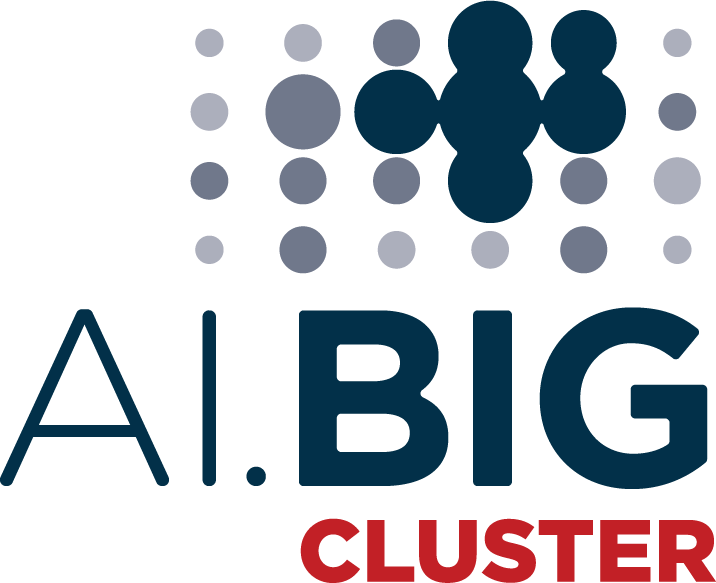Big Visual Data Analytics (BVDA) Workshop at the IEEE International Conference on Image Processing (ICIP 2024)
27-30 October 2024, Abu Dhabi, UAE
CALL FOR PAPERS
The ever-increasing visual data availability, leads to big visual data repositories or streams characterized by big data volumes, velocity (acquisition and processing speed), variety (e.g., RGB or RGB-D or hyperspectral images) complexity (e.g., video data and point clouds). Such big visual data necessitate novel and advanced analysis methods, in order to unlock their potential across diverse domains.
The Big Visual Data Analytics (BVDA) Workshop aims to explore this rapidly evolving field encompassing cutting-edge methods, emerging applications, and significant challenges in extracting meaning and value from large-scale visual datasets. From high-throughput biomedical imaging and autonomous driving sensors to satellite imagery and social media platforms, visual data has permeated nearly every aspect of our lives. Analyzing this data effectively requires efficient tools that go beyond traditional methods, leveraging advancements in machine learning, computer vision and data science. Exciting new developments in these fields are already paving the way for fully and semi-automated visual data analysis workflows at an unprecedented scale. This workshop will provide a platform for researchers and practitioners to discuss recent breakthroughs and challenges in big visual data analytics, explore novel applications across diverse domains (e.g., environment monitoring, natural disaster management, robotics, urban planning, healthcare, etc.), as well as for fostering interdisciplinary collaborations between computer vision, data science, machine learning, and domain experts. Its ultimate goal is to help identify promising research directions and pave the way for future innovations.
We invite researchers and practitioners working on various aspects of big visual data analytics to submit their work and engage in this exciting discourse. Arriving at a critical juncture in time, this workshop will provide a valuable forum to exchange ideas and accelerate the development of innovative methods for analyzing and interpreting the world around us through the lens of visual data. It concerns a very timely topic, since the surge in visual data generation across diverse domains has rendered the need for advanced analysis methods more pressing than ever. The variety of the scientific fields that jointly enable efficient big visual data analytics make this a highly interdisciplinary topic of exceptional interest to many types of specialists, such as computer vision experts, machine learning or data scientists, visualization specialists and domain experts.
The BVDA Workshop delves deeper into specific aspects of big visual data, complementing the broader ICIP themes. Thus it can generate new research interest and collaborations within the main conference community, while attracting researchers and practitioners specifically interested in big visual data analytics. Its interdisciplinary nature, its focus on cutting-edge areas (e.g., large Vision-Language Models, distributed deep neural architectures, fast generative models, etc.) and its synergies with neighboring fields (e.g., privacy-preserving analytics, real-time visual analytics, ethical considerations, etc.) broaden the discussion.
Topics of interest include (non-exhaustively) the following ones:
- Scalable algorithms and architectures for big visual data processing and analysis.
- High-performance computing, distributed and parallel processing, efficient data storage and retrieval for big visual data analysis.
- Deep learning architectures for large-scale visual content understanding, search & retrieval: Convolutional Neural Networks (CNNs), Transformers, Self-Supervised Learning, etc.
- Big visual data summarization.
- Decentralized/distributed DNN architectures for big visual data analysis.
- Cloud/edge computing architectures for big visual data analysis.
- Multimodal big visual data analysis.
- Large Vision-Language Models/Foundation Models.
- Fast generative models for visual data: Synthesizing realistic images/videos, data augmentation, in-painting and manipulation.
- Fast Interpretability and eXplainability (XAI) of visual analytics models: Understanding and communicating model decisions, trust and bias in AI systems.
- Privacy-preserving analytics in the context of big visual data: Secure data processing, differential privacy, federated learning.
- Visual analytics for real-time applications: Efficient analysis of visual streaming data, edge/fog computing.
- Visual analytics for specialized domains: Remote sensing, natural disaster management, medical imaging, social media analysis, etc.
- Ethical considerations in big visual data analytics: Data ownership, fairness, accountability, societal impact.
Details
The BVDA workshop will be half-day in duration and the submitted papers will be regularly reviewed. The accepted ones will be published in ICIP proceedings. Regular ICIP paper templates must be used for submission.
Submission URL:
https://cmsworkshops.com/ICIP2024/papers/submission.asp?Type=WS&ID=2
Important Dates:
- Paper Submission Deadline:
April 25, May 13, 2024 - Paper Acceptance Notification: June 6, 2024
- Final Paper Submission Deadline: June 19, 2024
- Author Registration Deadline: July 11, 2024
Organizers
- Ioannis Pitas (Aristotle University of Thessaloniki, Greece), e-mail address: pitas@csd.auth.gr
Prof. Ioannis Pitas (IEEE fellow, IEEE Distinguished Lecturer, EURASIP fellow) received the Diploma and PhD degree in Electrical Engineering, both from the Aristotle University of Thessaloniki (AUTH), Greece. Since 1994, he has been a Professor at the Department of Informatics of AUTH and Director of the Artificial Intelligence and Information Analysis (AIIA) lab. He served as a Visiting Professor at several Universities.
His current interests are in the areas of computer vision, machine learning, autonomous systems, intelligent digital media, image/video processing, human-centred computing, affective computing, 3D imaging and biomedical imaging. He has published over 970 papers, contributed to 46 books in his areas of interest and edited or (co-)authored another 15 books. He has also been member of the program committee of many scientific conferences and workshops. In the past he served as Associate Editor or co-Editor of 23 international journals and General or Technical Chair of 5 international conferences. He delivered 129 keynote/invited speeches worldwide. He co-organized 38 conferences and participated in technical committees of 291 conferences. He participated in 75+ R&D projects, primarily funded by the European Union and is/was principal investigator in 47 such projects. He is the coordinator of the Horizon Europe R&D project TEMA ( https://tema-project.eu/) , AUTH principal investigator in H2020 R&D projects Aerial Core (https://aerial-core.eu/), AI4Media (https://www.ai4media.eu/ one of the 4 H2020 ICT48 AI flagship projects) and Horizon Europe R&D projects AI4Europe (https://www.egi.eu/project/ai4europe/), SIMAR (https://simar-project.eu/). He is chair of the International AI Doctoral Academy (AIDA) (https://www.i-aida.org/). He was chair and initiator of the IEEE Autonomous Systems Initiative (https://ieeeasi.signalprocessingsociety.org/). He has 37300+ citations to his work and h-index 92+.
- Massimo Villari (University of Messina, Italy), e-mail address: massimo.villari@unime.it
Prof. Massimo Villari is Full Professor in Computer Science at University of Messina (Italy). He is actively working as IT Security and Distributed Systems Analyst in Cloud and Edge Computing, virtualization and Storage, Federated Learning and one of the creators of Osmotic Computing Paradigm. For the EU Projects “RESERVOIR” he lead the IT security activities of the whole project. For the EU Project “VISION-CLOUD” and “H2020-BEACON”, he covered the role of architectural designer for UniME. He was Scientific ICT Responsible in the EU Project frontierCities, the Accelerator of FIWARE on Smart Cities – Smart Mobility. He is strongly involved in EU Innovation initiatives, and also, he covers the role of EU external expert. Currently, he is Scientific ICT Responsible for UniME of “TEMA” and “NEUROKIT-2E” Horizon Europe Projects. He is co-author of more of 250 scientific publications and patents in Cloud Computing (Cloud Federation), Distributed Systems, Wireless Network, Network Security, Cloud Security and Cloud, Edge and IoTs, and recently in Osmotic Computing and AI. He was General Chair of ESOCC 2015 and IEEE-ISCC 2016. In 2014 he was recognized by an independent assessment (IEEE Cloud Computing Transaction, Issue April 2014) as one of World-Wide active scientific researchers, top 27 classification, in Cloud Computing Area. He was General Chair of IEEE-ICFEC 2019 and General Co-Chair in IEEE-CCGRID2022. He was also General Chair of IEEE ISCC2022 and will be of IEEE ISCC2024. He is in the Stanford World’s Top 2% Scientists list of the Stanford University in Computer Science. He is a Co-Founder of UniME Spin-Off Alma Digit S.R.L since 2017. He was Rector delegate on ICT for whole University of Messina and Academic and Consultant for the Messina Municipality in the Area of Smart Cities. Currently he is the Head of Computer Science and Data Science Schools.
- Ioannis Mademlis (Harokopio University of Athens, Greece), e-mail address: imademlis@hua.gr
Dr. Ioannis Mademlis is a computer scientist, specialized in artificial intelligence. He received a Ph.D. in machine learning and computer vision (2018) from the Aristotle University of Thessaloniki, Greece. In 2022-’23, he was an adjunct professor of machine learning at the Athens University of Economics and Business. Presently, he is employed as a postdoctoral researcher at the Harokopio University of Athens. He has participated in 6 European Union-funded R&D projects, having co-authored approximately 70 publications in academic journals and international conferences. He is an IEEE Senior Member and a committee member of the International Artificial Intelligence Doctoral Academy (IAIDA). His current research interests include machine learning, computer vision, autonomous robotics and human-computer interaction. He has an h-index of 19.
Supported by
This workshop is sponsored by TEMA, AI4Media, AIDA, AI.BIG Cluster, SIMAR, AI4Europe R&D projects. 







